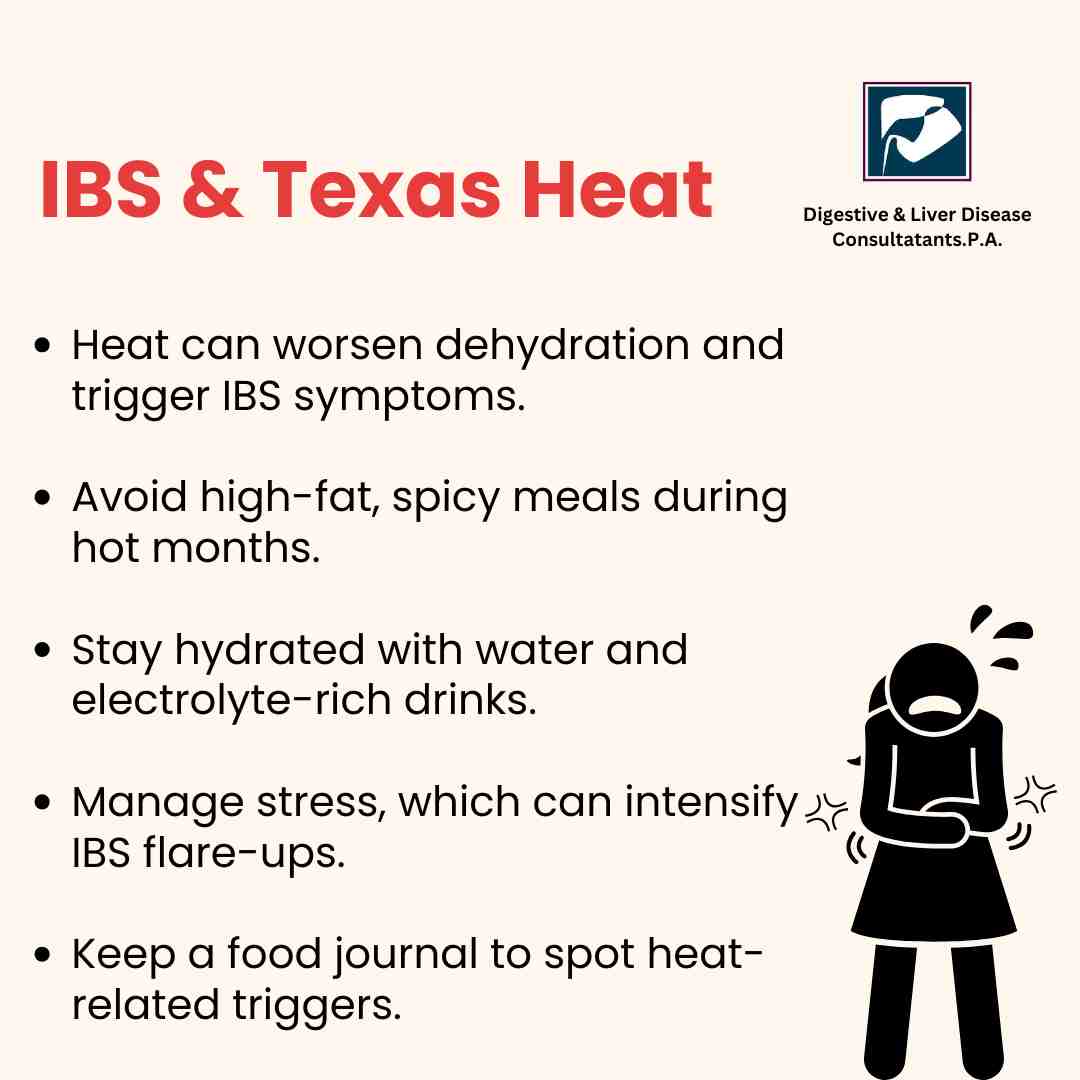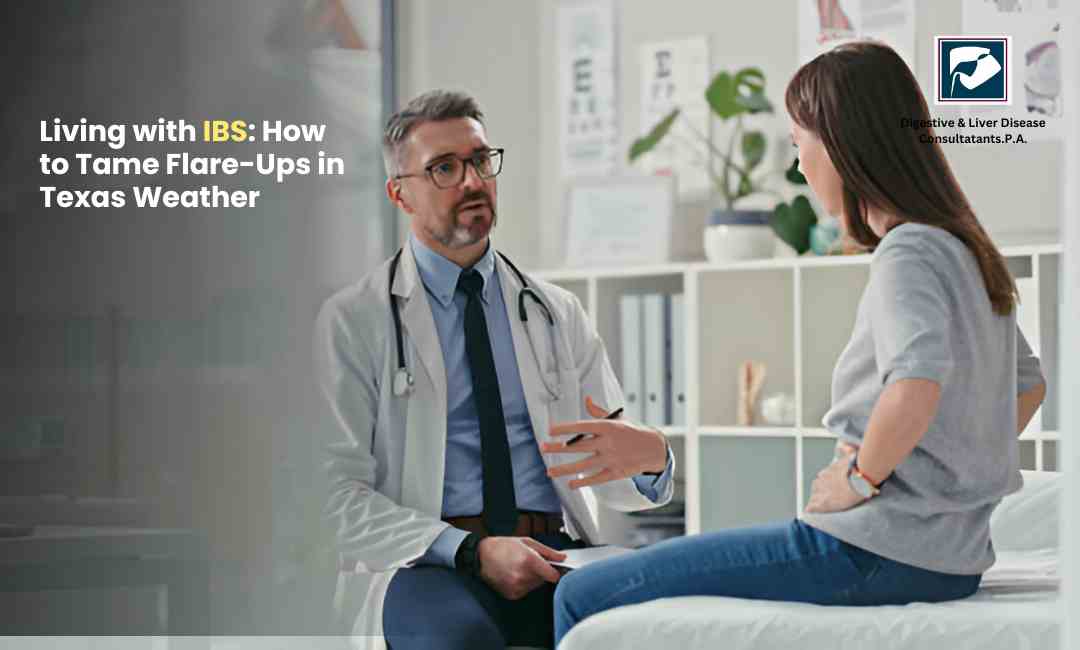Irritable Bowel Syndrome (IBS) can be an unpredictable and frustrating condition, especially when you live in a state like Texas where the weather can change in the blink of an eye. One day it’s sunny and hot, the next it’s rainy and humid, and in between, you might get a sudden cold front. For many people with IBS, these shifts in temperature, humidity, and seasonal allergens can make symptoms worse. But with the right strategies, you can take control of your health and minimize flare-ups.
Understanding IBS and Its Triggers
IBS is a common digestive disorder that affects the large intestine. It can cause symptoms such as abdominal pain, bloating, gas, diarrhea, constipation, or a mix of both. While the exact cause of IBS is still being researched, we know that certain factors can trigger or worsen symptoms, including diet, stress, hormonal changes, and yes, even the weather.
In Texas, extreme heat, high humidity, and seasonal changes can influence your body’s digestion. Hot weather can lead to dehydration, which affects bowel movements, while sudden cold spells can trigger stress responses in your gut. Allergens in the air, common in Texas during spring and fall, can also contribute to inflammation and digestive discomfort.

How Texas Weather Can Impact IBS
Heat and Dehydration: Hot summers can cause fluid loss through sweating. Dehydration can slow digestion, leading to constipation or cramping.
Cold Fronts: Sudden temperature drops can trigger the body’s “fight or flight” stress response, which can worsen IBS symptoms.
Humidity and Mold Allergens: High humidity can increase mold spores and allergens in the air, which may cause systemic inflammation and aggravate gut sensitivity.
Seasonal Food Changes: BBQ season, holiday feasts, and spicy local foods can be tempting, but they may not always be gut-friendly for IBS sufferers.
Tips to Tame IBS Flare-Ups in Texas Weather
Managing IBS is about understanding your personal triggers and making small, consistent changes to your lifestyle. Here are practical steps to help you stay comfortable year-round.
1. Stay Hydrated
Drinking enough water is one of the easiest ways to support digestion. In hot Texas summers, increase your fluid intake and add electrolyte-rich drinks if you sweat a lot. Avoid sugary sodas and limit caffeinated drinks, as they can dehydrate you.
2. Eat a Gut-Friendly Diet
Focus on foods that are gentle on your digestive system. Many people with IBS benefit from a low FODMAP diet, which limits certain carbohydrates that can ferment in the gut and cause gas or bloating. Examples of gut-friendly foods include:
- Oats and rice
- Bananas and blueberries
- Lean proteins like chicken and fish
- Cooked carrots, zucchini, and spinach
If you’re unsure what foods trigger your IBS, keep a food diary and work with a gastroenterologist or dietitian to identify patterns.
3. Limit Heat-Triggering Foods in Summer
In extreme heat, avoid greasy, fried, or overly spicy foods that may intensify symptoms. Instead, try cooling meals such as salads with cooked vegetables, smoothies with lactose-free yogurt, and grilled lean proteins.
4. Protect Your Gut During Cold Fronts
Sudden drops in temperature can increase stress levels, which may disrupt digestion. During cold snaps, focus on warm, easy-to-digest meals like soups, stews, and herbal teas. Gentle exercise, such as indoor stretching or yoga, can also help reduce stress-induced IBS flare-ups.
5. Manage Stress Year-Round
Stress is one of the most significant IBS triggers, and Texas weather events such as storms, hurricanes, or even heat advisories can add to daily anxiety. To manage stress:
- Practice mindfulness meditation or deep breathing
- Schedule regular physical activity
- Maintain a consistent sleep routine
- Take breaks from screens and social media
6. Avoid Allergen-Related IBS Triggers
During allergy season, pollen and mold exposure can increase inflammation in the body. For those with IBS, this can indirectly worsen gut symptoms. Keep windows closed on high pollen days, use air purifiers, and shower after spending time outdoors.
7. Travel Smart Around Texas
Whether you’re heading to a BBQ festival in Austin, a beach trip to Galveston, or a rodeo in Houston, travel can disrupt your eating patterns and routine. Pack IBS-friendly snacks, stay hydrated, and try to eat at consistent times to keep your digestion on track.
When to See a Doctor for IBS in Texas
If your symptoms become severe, interfere with your daily life, or change suddenly, it’s important to see a specialist. Warning signs that require medical attention include:
- Unexplained weight loss
- Blood in stool
- Persistent diarrhea or constipation
- Severe abdominal pain that does not improve with rest or dietary changes
A gastroenterologist can help diagnose your condition, rule out other digestive disorders, and create a personalized treatment plan.
About Digestive & Liver Disease Consultants, P.A.
At Digestive & Liver Disease Consultants, P.A., we understand how challenging IBS can be, especially with the added impact of Texas weather. Our board-certified gastroenterologists have years of experience diagnosing and managing IBS, using a combination of advanced testing, personalized diet plans, and the latest treatment options.
We take a patient-first approach, meaning we listen to your concerns, identify your unique triggers, and work with you to create a plan that helps you live life with fewer symptoms. Whether you need a simple lifestyle adjustment or more advanced care, our team is here to support you every step of the way.
Our clinics serve patients across Texas, providing compassionate care in a comfortable, supportive environment.
Conclusion
Living with IBS in Texas means learning how to navigate both your symptoms and the unpredictable weather. By staying hydrated, eating gut-friendly foods, managing stress, and avoiding known triggers, you can reduce the frequency and severity of flare-ups. And remember, you don’t have to manage IBS alone.
If you suffer from IBS or other digestive issues, the specialists at Digestive & Liver Disease Consultants, P.A., are here to help. Contact us today to schedule an appointment and take the first step toward better digestive health.






